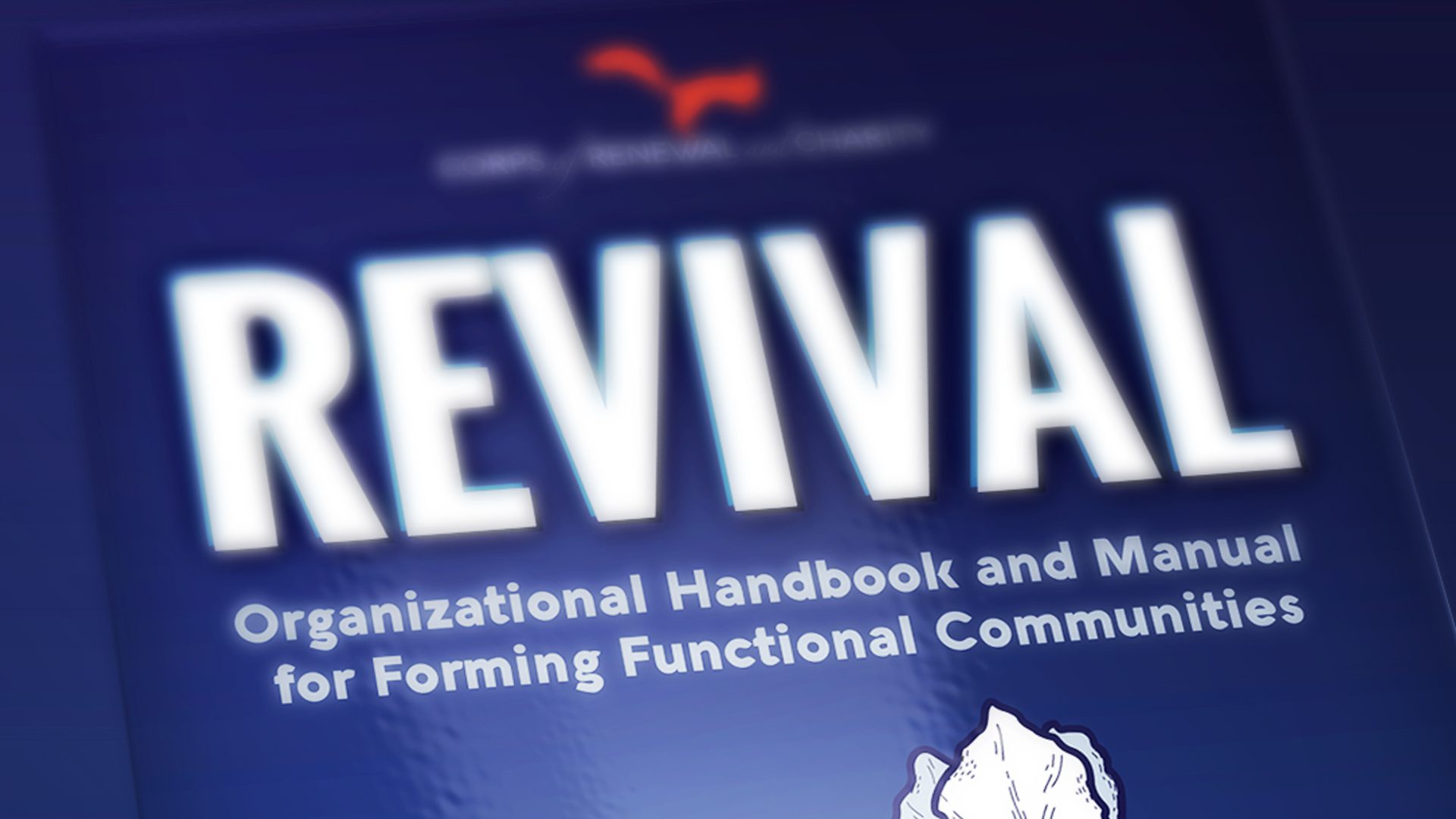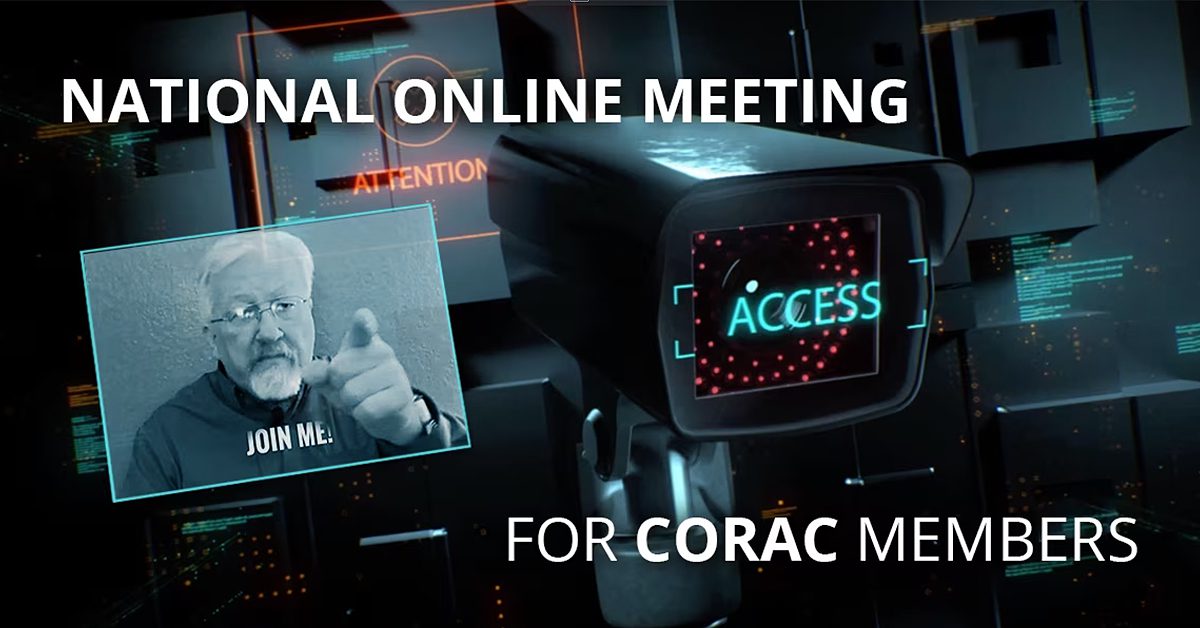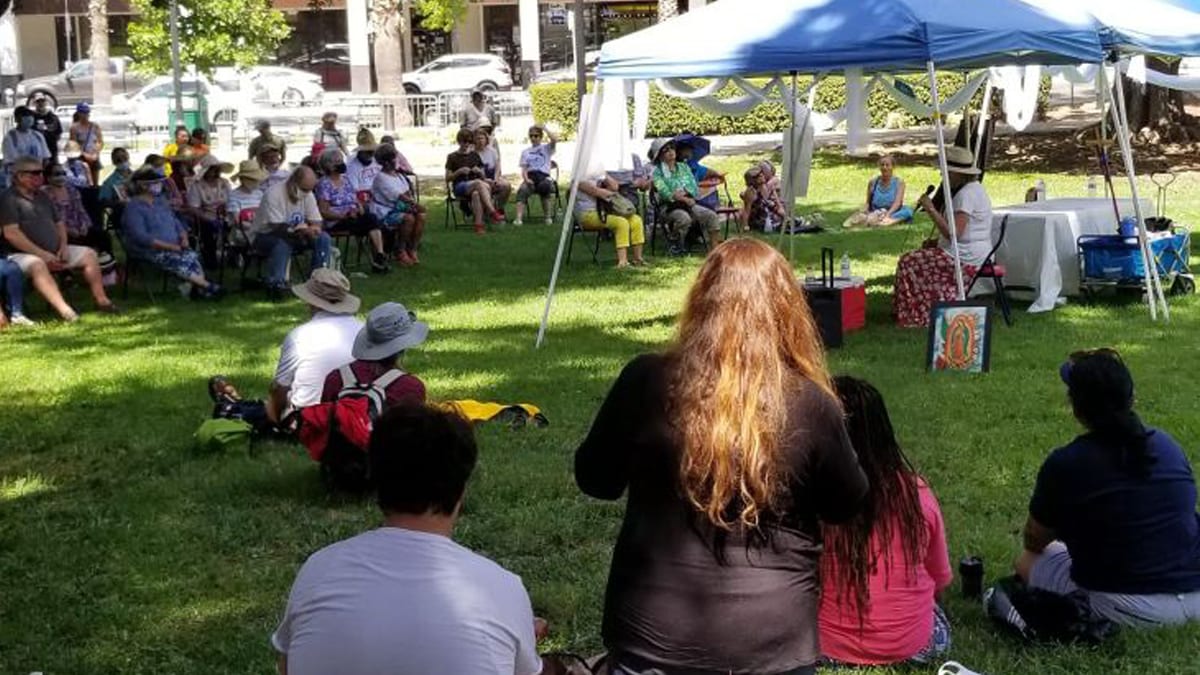| Pharaoh’s Magicians | 2024-07-20 | Charlie's Brief, Featured Media | charlie's brief, brief, video, trump | charlies-brief featured-media corac-leaders-forum |
| CORAC Newsletter | 2024-07-16 | CORAC Leaders Forum, National News, Featured Media | news, newsletter | corac-leaders-forum national-news featured-media |
| Speaking to Build Up | 2024-06-20 | Charlie's Brief, Featured Media | charlie's brief, brief, video, minnesota prepper expo, preparation | charlies-brief featured-media corac-leaders-forum |
| They Are Like Chaff | 2024-06-19 | Charlie's Brief, Featured Media | charlie's brief, brief, video, Holy Spirit, psalm 1, war | charlies-brief featured-media corac-leaders-forum |
| From the Cockpit of the Subaru | 2024-06-16 | CORAC Leaders Forum, Featured Media | newsletter column, charlie's writings, charlie johnston | corac-leaders-forum featured-media |
| Revival – Coming July 2024 | 2024-06-13 | CORAC Leaders Forum, Featured Media | charlie's writings, book, renewal | corac-leaders-forum featured-media |
| Simple Joy & Devotions | 2024-06-12 | Charlie's Brief, Featured Media | charlie's brief, brief, video, pope leo xiii, joy, simple devotions, evangelize | charlies-brief featured-media corac-leaders-forum |
| Founding Fathers | 2024-06-06 | Charlie's Brief, Featured Media | charlie's brief, brief, video, historical figures, founding fathers, john adams, thomas jefferson | charlies-brief featured-media corac-leaders-forum |
| Thy Will Be Done | 2024-05-23 | Charlie's Brief, Featured Media | prayer, charlie's brief, brief, video, healing, miracles | charlies-brief featured-media corac-leaders-forum |
| Who Is Going To Stop It? | 2024-05-15 | Charlie's Brief, Featured Media | charlie's brief, brief, video, rebuilding society, just say no | charlies-brief featured-media corac-leaders-forum |
| Blowback Cometh | 2024-05-01 | Charlie's Brief, Featured Media | charlie's brief, brief, video, rebuilding society, campus protest, failing institutions | charlies-brief featured-media corac-leaders-forum |
| Darkest Before the Dawn | 2024-04-15 | Charlie's Brief, Featured Media | charlie's brief, brief, video, prolife, abortion | charlies-brief featured-media corac-leaders-forum |
| Beware Spiritual Bullies | 2024-04-10 | Charlie's Brief, Featured Media | charlie's brief, brief, video, gurus, spiritual bullies, formulas | charlies-brief featured-media corac-leaders-forum |
| Mark Kollar – Catholic Healing Evangelist | 2024-04-01 | Featured Media, Reveille | reveille, podcast, video, mp, healing ministry, miraculous healings | featured-media reveille corac-leaders-forum |
| In a Nutshell | 2024-03-27 | Charlie's Brief, Featured Media | charlie's brief, brief, video, apparitions, sacred scripture | charlies-brief featured-media corac-leaders-forum |
| Do the Right Thing | 2024-03-16 | Charlie's Brief, Featured Media | charlie's brief, brief, battle, doing | charlies-brief featured-media corac-leaders-forum |
| The Hour of Our Discontent | 2024-03-14 | Charlie's Brief, Featured Media | charlie's brief, brief, battle, doing | charlies-brief featured-media corac-leaders-forum |
| Going My Way? | 2024-03-07 | Charlie's Brief, Featured Media | charlie's brief, brief, advent, christmas, the manger | charlies-brief featured-media corac-leaders-forum |
| Paul List – Mount Doom | 2024-02-10 | Featured Media, Reveille | reveille, podcast, video, joe gallagher, paul lint, tolkien, artificial intelligence | featured-media reveille corac-leaders-forum |
| The Red Squirrel | 2024-01-14 | CORAC Leaders Forum, Featured Media | video, alert, membership, squirrels | corac-leaders-forum featured-media |
| Kyoshi Scott Maczuga – Christian Warriors | 2023-12-20 | Featured Media, Reveille | reveille, podcast, scott maczuga, physical fitness, discipline, physical training, martial arts, self defense, video, joe gallagher | featured-media reveille corac-leaders-forum |
| Blessings to You This Christmas | 2023-12-15 | CORAC Leaders Forum, Featured Media | video, advent, christmas, christmas card | corac-leaders-forum featured-media |
| What a Glorious Christmas This Is | 2023-12-15 | Charlie's Brief, Featured Media | charlie's brief, brief, advent, christmas, the manger | charlies-brief featured-media corac-leaders-forum |
| Jesse Romero – Defense! | 2023-12-06 | Featured Media, Reveille | reveille, physical fitness, discipline, self defense, video, joe gallagher, coracast, jesse romero, spiritual fitness | featured-media reveille corac-leaders-forum |
| Dare Greatly | 2023-12-05 | Charlie's Brief, Featured Media | podcast, charlie's brief, video | charlies-brief featured-media corac-leaders-forum |
| Leave the Gun. Take the Cannoli. | 2023-12-01 | Charlie's Brief, Featured Media | podcast, charlie's brief, brief, video | charlies-brief featured-media corac-leaders-forum |
| CORAC Global Zoom Session 5 (Video) | 2023-11-06 | CORAC Leaders Forum, Featured Media, Global Meetings | video, global meeting, coracast | corac-leaders-forum featured-media global-meetings |
| Doug Barry – Keeping It Simple | 2023-10-11 | Featured Media, Reveille | preparedness, reveille, podcast, discipline, video, joe gallagher, doug barry, brcoalition | featured-media reveille corac-leaders-forum |
| Blessing of the Lost Girls | 2023-10-06 | Charlie's Brief, Featured Media | podcast, charlie's brief, video, ja jance | charlies-brief featured-media corac-leaders-forum |
| A Game of Baseball | 2023-10-03 | Charlie's Brief, Featured Media | podcast, charlie's brief, video | charlies-brief featured-media corac-leaders-forum |
| Belling The Cat | 2023-09-21 | Charlie's Brief, Featured Media | podcast, charlie's brief, video | charlies-brief featured-media corac-leaders-forum |
| A Wisconsin Field Day – Back to Basics | 2023-08-19 | Featured Media, Reveille | preparedness, reveille, podcast, video, joe gallagher, home skills, farino's, region 9, field day, wisconsin | featured-media reveille corac-leaders-forum |
| It Is the Religion of Ignorance That Tyranny Begins | 2023-08-14 | Charlie's Brief, Featured Media | podcast, charlie's brief, video | charlies-brief featured-media corac-leaders-forum |
| The World of Squirrels? | 2023-08-09 | Charlie's Brief, Featured Media | podcast, charlie's brief, video | charlies-brief featured-media corac-leaders-forum |
| Regular Podcast | 2023-08-07 | CORAC Leaders Forum, National News, Featured Media | podcast, video, chatting with charlie, seven questions, dr. joe | corac-leaders-forum national-news featured-media |
| A Heritage Deeply Embedded in the American DNA | 2023-07-31 | Charlie's Brief, Featured Media | podcast, charlie's brief, video | charlies-brief featured-media corac-leaders-forum |
| A Dead Parrot Sketch | 2023-07-27 | Charlie's Brief, Featured Media | podcast, charlie's brief, video | charlies-brief featured-media corac-leaders-forum |
| Be a Light to the Homebound | 2023-07-24 | CORAC Leaders Forum, National News, Leader Resources, Downloads (LF) | go forth, home visits, initiative, community | corac-leaders-forum national-news leader-resources downloads-lf |
| Be a Light at the Supermarket | 2023-07-19 | CORAC Leaders Forum, Downloads (LF) | go forth, initiative, community charity | corac-leaders-forum downloads-lf |
| CORAC Global Zoom Session 4 (Video) | 2023-07-17 | CORAC Leaders Forum, Featured Media, Global Meetings | video, global meeting, coracast | corac-leaders-forum featured-media global-meetings |
| Continue Hoeing the Beans | 2023-06-29 | Charlie's Brief, Featured Media | podcast, charlie's brief, video | charlies-brief featured-media corac-leaders-forum |
| Aslan is on the Move | 2023-06-26 | Charlie's Brief, Featured Media | podcast, charlie's brief, video | charlies-brief featured-media corac-leaders-forum |
| Bind Yourself to God’s Will | 2023-06-20 | Charlie's Brief, Featured Media | podcast, charlie's brief, video | charlies-brief featured-media corac-leaders-forum |
| Finding Our Courage | 2023-06-13 | CORAC Leaders Forum, Leader Resources, General Leaders Forum Discussion, Downloads (LF) | leadership education, leadership, courage | corac-leaders-forum leader-resources general-leaders-forum-discussion downloads-lf |
| Be the Lighthouse | 2023-05-23 | Charlie's Brief, Featured Media | podcast, charlie's brief, video | charlies-brief featured-media corac-leaders-forum |
| It’s Speeding Up Dramatically, Folks | 2023-05-18 | Charlie's Brief, Featured Media | podcast, charlie's brief, video | charlies-brief featured-media corac-leaders-forum |
| Go Forth | 2023-04-26 | CORAC Leaders Forum, Featured Media | video, go forth, initiative, side by side, community | corac-leaders-forum featured-media |
| CORAC Global Zoom Session 3 (Video) | 2023-04-24 | CORAC Leaders Forum, Featured Media, Global Meetings | video, global meeting, coracast | corac-leaders-forum featured-media global-meetings |
| Judgment Call | 2023-04-10 | Charlie's Brief, Featured Media | podcast, charlie's brief, video | charlies-brief featured-media corac-leaders-forum |
| The Misery Farm | 2023-03-31 | Charlie's Brief, Featured Media | podcast, charlie's brief, video | charlies-brief featured-media corac-leaders-forum |
| A New Ally | 2023-03-30 | Charlie's Brief, Featured Media | podcast, charlie's brief, video | charlies-brief featured-media corac-leaders-forum |
| From the Ground Up | 2023-03-28 | CORAC Leaders Forum, Featured Media | video, leadership education, leadership, coracast, teams, grassroots, mp, team leaders | corac-leaders-forum featured-media |
| CORAC Global Airmeet Session 2 (Video) | 2023-02-28 | CORAC Leaders Forum, Featured Media, Global Meetings | video, global meeting, coracast | corac-leaders-forum featured-media global-meetings |
| A Tower of Babel Moment | 2023-02-13 | Charlie's Brief, Featured Media | podcast, charlie's brief, video | charlies-brief featured-media corac-leaders-forum |
| World Weariness | 2023-02-08 | Charlie's Brief, Featured Media | podcast, charlie's brief, video | charlies-brief featured-media corac-leaders-forum |
| America: Lost in Place | 2023-02-08 | CORAC Leaders Forum, National News, Featured Media | dr. joe, books | corac-leaders-forum national-news featured-media |
| Get Back in Your Lanes | 2023-02-06 | Charlie's Brief, Featured Media | podcast, charlie's brief, video | charlies-brief featured-media corac-leaders-forum |
| How Do We Build Anew? | 2023-02-02 | Charlie's Brief, Featured Media | podcast, charlie's brief, video | charlies-brief featured-media corac-leaders-forum |
| Two Trains Crashing | 2023-01-29 | Charlie's Brief, Featured Media | podcast, charlie's brief, video | charlies-brief featured-media corac-leaders-forum |
| The Quiet Girding | 2023-01-25 | Charlie's Brief, Featured Media | podcast, charlie's brief, video | charlies-brief featured-media corac-leaders-forum |
| Keep Steady | 2022-12-26 | Charlie's Brief, Featured Media | podcast, charlie's brief, video | charlies-brief featured-media corac-leaders-forum |
| God’s Ways Are Not Man’s Ways | 2022-12-15 | Charlie's Brief, Featured Media | podcast, charlie's brief, video | charlies-brief featured-media corac-leaders-forum |
| Merry Christmas! | 2022-12-15 | Charlie's Brief, Featured Media | video, advent, christmas, christmas card | charlies-brief featured-media corac-leaders-forum |
| A Lot To Do In The New Year | 2022-12-09 | Charlie's Brief, Featured Media | podcast, charlie's brief, video | charlies-brief featured-media corac-leaders-forum |
| Region 8 Field Day | 2022-11-16 | CORAC Leaders Forum, Regional News, Other Media | preparedness, doug barry, field day, region 8, self sufficiency, mother miriam, community | corac-leaders-forum regional-news other-media |
| What’s Required Now | 2022-11-03 | Charlie's Brief, Featured Media | podcast, charlie's brief, video | charlies-brief featured-media corac-leaders-forum |
| Build The Right Mindeset | 2022-10-28 | Charlie's Brief, Featured Media | podcast, charlie's brief, video | charlies-brief featured-media corac-leaders-forum |
| A Structure of Neighbors | 2022-10-21 | Charlie's Brief, Featured Media | podcast, charlie's brief, video | charlies-brief featured-media corac-leaders-forum |
| Procession With Our Lady of Guadalupe | 2022-10-19 | CORAC Leaders Forum, Regional News, Other Media | prayer, field day, go forth, region 12, community, st. malo, mt. meeker, our lady of guadalupe, procession | corac-leaders-forum regional-news other-media |
| The Crisis in the Church Today Video | 2022-10-17 | Charlie's Brief, Featured Media | podcast, charlie's brief, video | charlies-brief featured-media corac-leaders-forum |
| Gun Laws Event (Video Photo Album) | 2022-10-03 | CORAC Leaders Forum, Regional News, Other Media | region 9, go forth, community, inspiration, 2nd amendment, gun safety, gun laws | corac-leaders-forum regional-news other-media |
| CORAC National Zoom Session 1 (Video) | 2022-09-21 | CORAC Leaders Forum, Featured Media, Global Meetings | video, global meeting, coracast | corac-leaders-forum featured-media global-meetings |
| CORAC National Zoom Session Invitation | 2022-09-01 | CORAC Leaders Forum, Featured Media, Global Meetings | video, global meeting, coracast, invitation | corac-leaders-forum featured-media global-meetings |
| It’s Here. It’s Now. (Video) | 2022-08-26 | Charlie's Brief, Featured Media | podcast, charlie's brief, video | charlies-brief featured-media corac-leaders-forum |
| Start Doing This Now (Video) | 2022-08-16 | Charlie's Brief, Featured Media | podcast, charlie's brief, video | charlies-brief featured-media corac-leaders-forum |
| Value Them Both – Special Podcast | 2022-07-26 | CORAC Leaders Forum, Regional News, Other Media | dr. joe, go forth, community, inspiration, prolife, activism, region 10 | corac-leaders-forum regional-news other-media |
| Think and Act Anew (Video) | 2022-07-22 | Charlie's Brief, Featured Media | podcast, charlie's brief, video | charlies-brief featured-media corac-leaders-forum |
| We’re The Guys That Do Stuff! (Video) | 2022-04-20 | Charlie's Brief, Featured Media | podcast, charlie's brief, video | charlies-brief featured-media corac-leaders-forum |
| A Chalk Talk (Video) | 2022-04-08 | Charlie's Brief, Featured Media | podcast, charlie's brief, video | charlies-brief featured-media corac-leaders-forum |
| Consider the Squirrels | 2022-01-22 | CORAC Leaders Forum, Inspiring Stories, Other Media | region 9, go forth, community, inspiration, squirrels | corac-leaders-forum inspiring-stories other-media |
| A Gut Punch to Mandatory Compliance | 2022-01-12 | Charlie's Brief, Featured Media | covid, charlie's brief, vaxx, charlie's writings | charlies-brief featured-media corac-leaders-forum |
| Region 8 Newsletter | 2021-12-10 | CORAC Leaders Forum, Regional News, Other Media | go forth, region 8, community, inspiration, regional newsletter | corac-leaders-forum regional-news other-media |
| Simple Quotes to Ponder in Charity | 2021-11-12 | CORAC Leaders Forum, General Leaders Forum Discussion, Downloads (LF) | leadership, initiative, inspiration, quotes | corac-leaders-forum general-leaders-forum-discussion downloads-lf |
| Simple Quotes to Ponder on the Road to Renewal | 2021-11-12 | CORAC Leaders Forum, General Leaders Forum Discussion, Downloads (LF) | leadership, initiative, inspiration, quotes | corac-leaders-forum general-leaders-forum-discussion downloads-lf |
| The J6 Project | 2021-11-11 | CORAC Leaders Forum, Top Stories, National News, Regional News, Leader Resources, Downloads (LF) | go forth, initiative, community, inspiration, activism, j6, j6 project | corac-leaders-forum top-stories national-news regional-news leader-resources downloads-lf |
| Stuff Every Leader Should Be Doing to Serve Well | 2021-11-03 | CORAC Leaders Forum, Leader Resources, General Leaders Forum Discussion, Downloads (LF) | leadership education, leadership, teamwork, servant | corac-leaders-forum leader-resources general-leaders-forum-discussion downloads-lf |
| Stuff We Should Be Doing Every Day | 2021-11-01 | CORAC Leaders Forum, Leader Resources, General Leaders Forum Discussion, Downloads (LF) | prayer, leadership education, leadership, teamwork | corac-leaders-forum leader-resources general-leaders-forum-discussion downloads-lf |
| What is CORAC? | 2021-10-31 | CORAC Leaders Forum, Top Stories, National News, Regional News, Leader Resources, General Leaders Forum Discussion, Other Media | about, corac | corac-leaders-forum top-stories national-news regional-news leader-resources general-leaders-forum-discussion other-media |
| Building Bridges (Updated) | 2021-09-19 | Inspiring Stories | go forth, community, inspiration, region 7, people's bridge, activism | inspiring-stories corac-leaders-forum |
| Bibles, Beans & Bullets | 2021-09-13 | CORAC Leaders Forum, Regional News, Other Media | preparedness, region 9, go forth, self sufficiency, community, inspiration | corac-leaders-forum regional-news other-media |
| Overcoming “Busyness” | 2021-09-08 | CORAC Leaders Forum, Leader Resources, Downloads (LF) | leadership education, leadership, time management | corac-leaders-forum leader-resources downloads-lf |
| The Map On The Wall | 2021-09-05 | CORAC Leaders Forum, Leader Resources, Downloads (LF) | leadership, teamwork | corac-leaders-forum leader-resources downloads-lf |
| Doing it Anyway | 2021-08-21 | Inspiring Stories | prayer, region 9, go forth, community, inspiration, prayer cards | inspiring-stories corac-leaders-forum |
| Taking a Stand | 2021-08-13 | Inspiring Stories | vaxx, vaccines, go forth, community, inspiration, region 14 | inspiring-stories corac-leaders-forum |
| Jab Religious Exemption Downloads | 2021-07-30 | Health & Wellness, Health News, CORAC Leaders Forum, Downloads (H&W), Downloads (LF) | vaxx, vaccines, vaxx exemption | health-and-wellness health-news corac-leaders-forum downloads-hw downloads-lf |
| Team Building Guide | 2021-06-16 | CORAC Leaders Forum, Leader Resources, Downloads (LF) | leadership education, leadership, teamwork, teambuilding | corac-leaders-forum leader-resources downloads-lf |
| Leaders Forum – General Discussion | 2021-06-15 | CORAC Leaders Forum, General Leaders Forum Discussion | conversation, discussion | corac-leaders-forum general-leaders-forum-discussion |
| Defending The Constitution | 2021-05-24 | Inspiring Stories | go forth, community, inspiration, region 7, sheriff mack, constitution | inspiring-stories corac-leaders-forum |
| Walking With The Real Presence | 2021-01-28 | Inspiring Stories | go forth, community, procession, inspiration, region 15, holy eucharist | inspiring-stories corac-leaders-forum |
| Celebrating Life | 2020-12-07 | Inspiring Stories | go forth, region 8, community, inspiration, prolife | inspiring-stories corac-leaders-forum |
| Living Rosary | 2020-08-15 | Inspiring Stories | rosary, go forth, initiative, community, inspiration, region 15 | inspiring-stories corac-leaders-forum |

























































































Another great one for me to print out for future reference. Thanks, MP.
Insightful article. Many details that I can ponder in prayer. Thank you
seriously good stuff, MP. Thank you